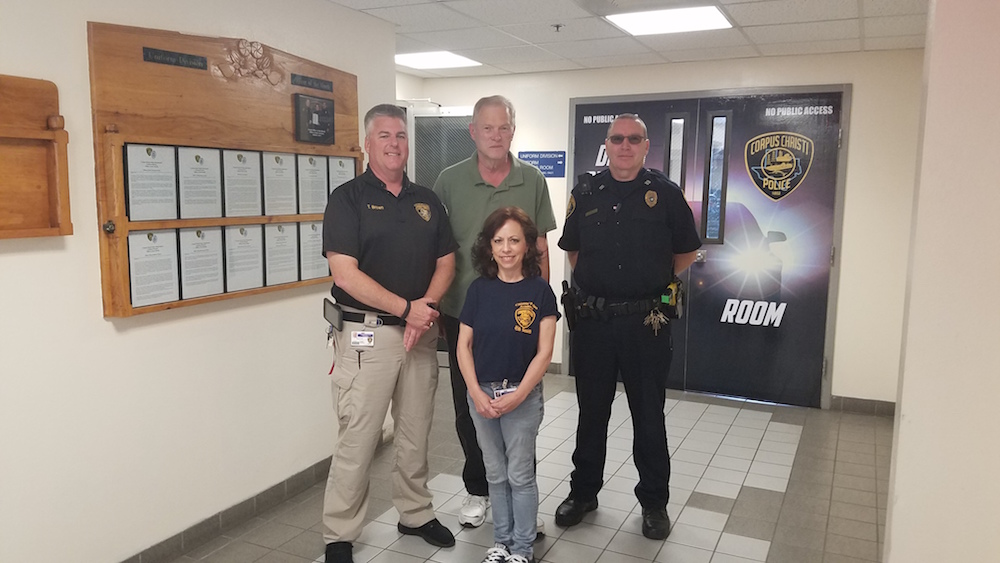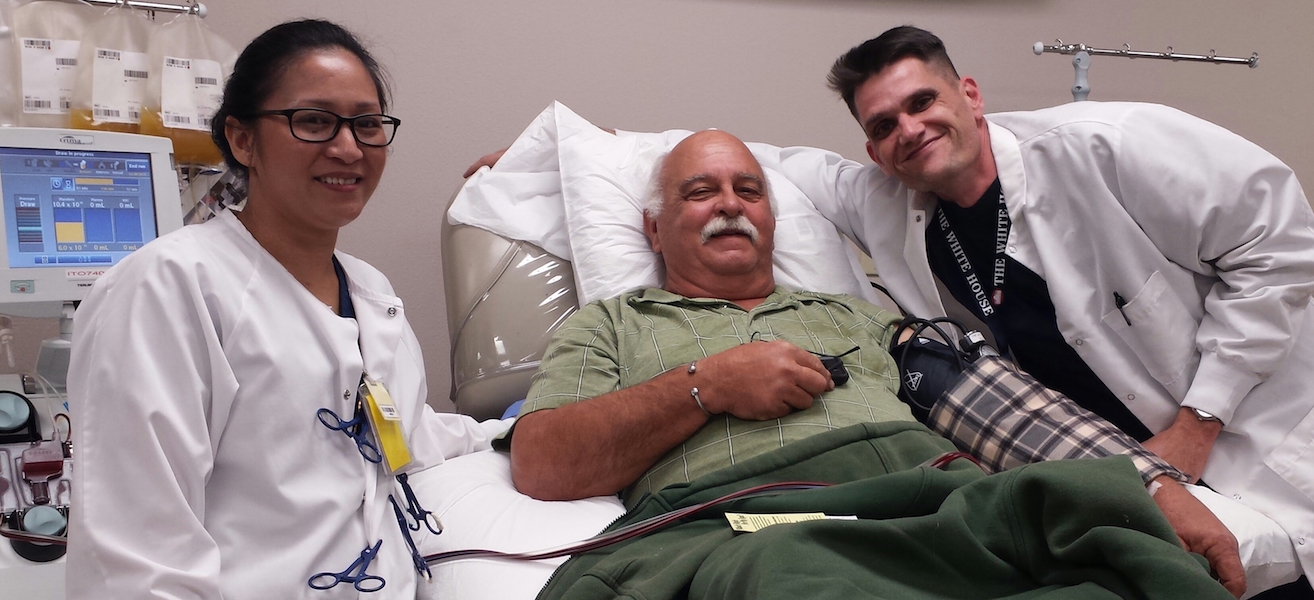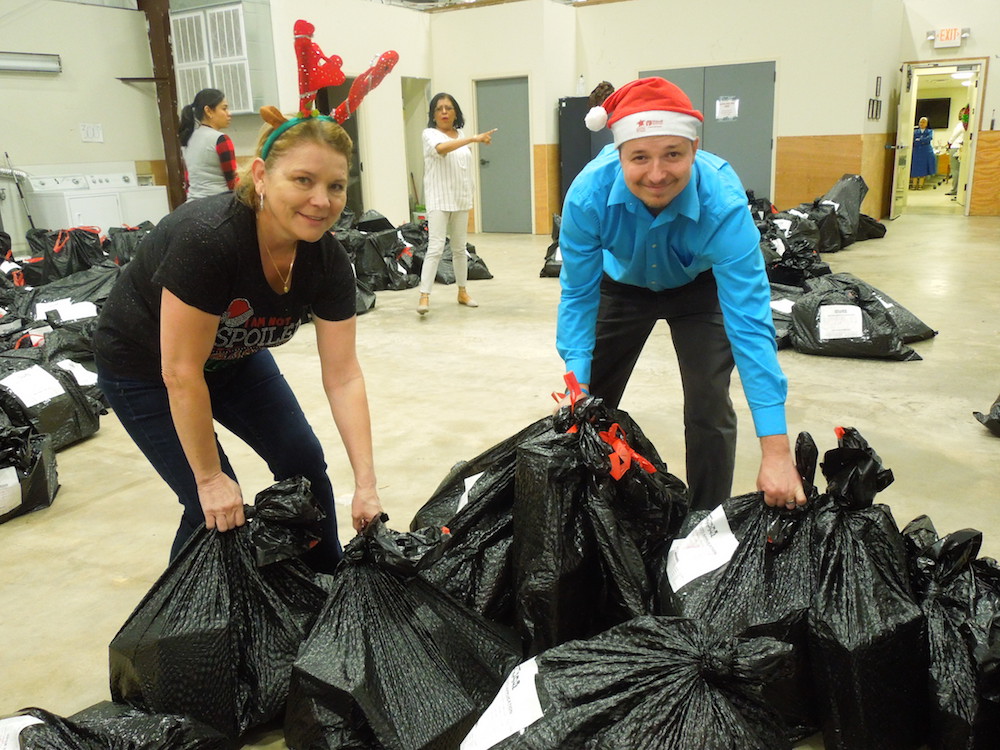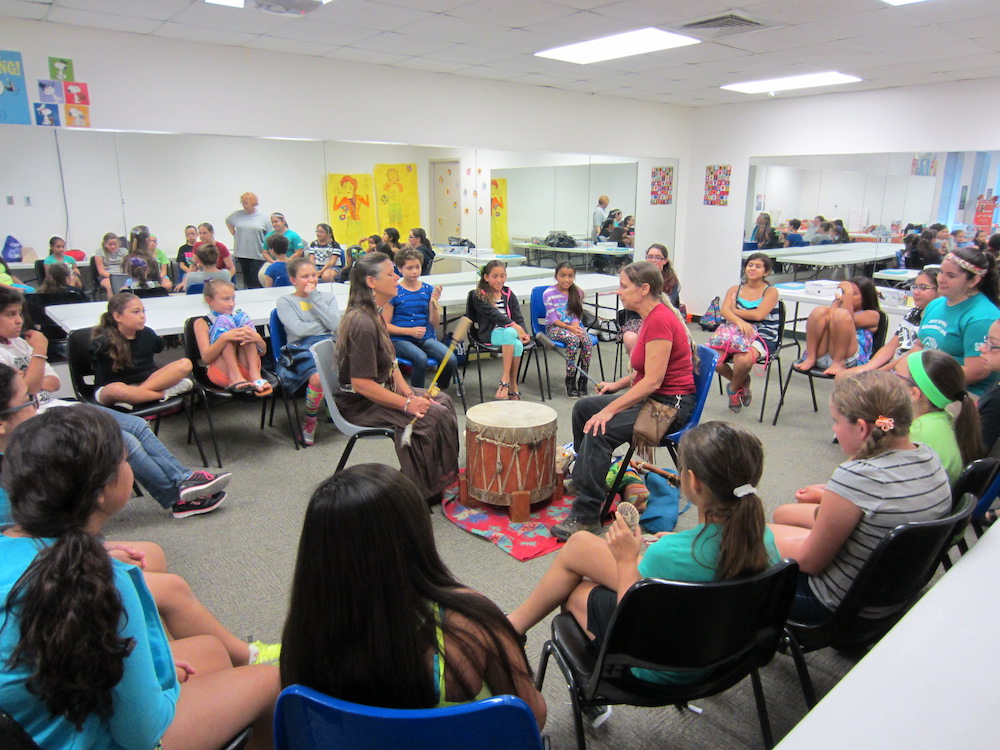
Police volunteer coordinator Tom Brown (left) and Capt. Russell Sherman (right) with volunteers Celeste Hogin and Wayne Bortner at Corpus Christi police headquarters at 321 John Sartain St. in downtown. Photo by Jane Kathleen Gregorio
One-sixth of the people working for the Corpus Christi Police Department do not get paid, but they love the job and are essential parts of the city’s law enforcement team. Volunteers in Police Service, also known as VIPS, plays a vital role in filling vacancies and providing extra help for the police department, said VIPS coordinator Officer Tom Brown.
“They consist of people who work here but are not compensated, which includes our reserve police officers, our police chaplain, police explorers, our Citizens Police Academy alumni and our general volunteers,” Brown said. “They supplement the police department in traditional non-law-enforcement roles in areas that are shorthanded or could just use additional help.”
That also includes helping in administration, criminal investigations and operations divisions.
The program launched nationwide shortly after the terrorist attacks of Sept. 11, 2001, under President George W. Bush. It was initially designed by a group of police chiefs from cities across the country.
In Corpus Christi, the VIPS program officially began in 2010. A retired U.S. Navy veteran with law enforcement experience, Brown became coordinator for the program in 2013. He quickly created a process for tracking volunteers’ areas of interest and the number of hours each could work. The program matches the right volunteer to areas that need help.
“We strive to place you in an area of the department that is of interest to you, where your skills and talents best match the requirements of the position," Brown said.
Wayne Bortner, a volunteer for the Criminal Investigation reception desk has been donating his time to the police department for the past five years. A retiree, he has a background in police work in Michigan. He answers phones and talks to walk-ins at the counter.
"Every day is a new experience, new things are going on,” he said. “Mostly, I enjoy assisting our elderly citizens and their interactions with the police department. Helping the public and being on top of all the things happening in Corpus Christi is what I love most about volunteering.”
Volunteer Celeste Hogin spends six hours a day, four days a week working in the Criminal Investigation Division of Family Violence. She gathers the 911 recorded calls associated with cases.
“What motivates me is that it’s a very direct way to give back to the community,” she said. “It’s a difference you can see right away. We have different volunteer groups such as Citizens Police Academy as well as VIPS, but anyone who wants to help crime rates go down in the community, this is the perfect place.”
According to Lt. Chris McClure, who works with Hogin, volunteers save detectives hours of work a day.
“Because our officers are busy with cases here in Family Violence, a detective will be assigned 40 cases a month,” he said. “They don’t have time to do all the administrative stuff that comes with filing a case. Volunteers like Celeste really help us out.”
Capt. Russell Sherman of the Uniform Division has worked with many volunteers over the years and acknowledges the valuable role they play.
“They may not be paid employees, but they have just as much, if not more, passion, commitment and dedication as our paid workers,” he said. “And it's wonderful that, whenever we assign them tasks, they are very responsive and helpful.”
Volunteers become part of the police department family, Brown added.
“The more time they spend with the officers, the more integrated they become," he said.
HOW TO VOLUNTEER
To apply, contact Brown at (361) 886-2832 or at TomB@cctexas.com.
An orientation and specialty training are provided for all accepted volunteers. Opportunities include, but are not limited to, clerical work, reception desks, disabled parking patrol, public awareness, Criminal Investigations Division, forensics, Crime Stoppers, Metro-Com (911), narcotics, vice, Animal Care Services, city impound and building maintenance.
Another area is the video operation center, where camera systems in public areas around the community are monitored.
“It’s relatively new to us here, so it’s not manned full time,” Brown said. “If a crime occurs, we go to cameras in that vicinity (if there are any) and excerpt videos from that time frame. Sometimes, that could be the deciding factor for a prosecution. Most of those manning them are volunteers.”
Another need is for volunteers to ticket vehicles illegally parked in disabled parking zones. Parking patrol volunteers undergo a minimum of four hours training on how to cite and report violations.
Volunteers are also needed to help with customer service at the vehicle impound lot, which entails answering phone calls and manning the counters.
The District Attorney’s office is looking for volunteers to work in criminal investigations building court cases for the prosecution.
“I’m so thankful for the volunteers who spend their time saving us time,” McClure said. “It makes us more efficient in serving the community.”




